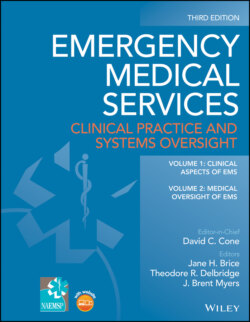Читать книгу Emergency Medical Services - Группа авторов - Страница 183
Shock of Unclear Etiology
ОглавлениеIn some clinical scenarios, the primary etiology for the patient’s shock state may be difficult to determine despite careful history taking and physical examination. Focused ultrasound may be helpful identifying hypovolemia (inferior vena cava), hemorrhage (FAST, aortic exam), obstructive shock (pneumothorax, cardiac tamponade, right heart strain consistent with pulmonary embolus), or cardiogenic shock (hypokinetic wall, valvular dysfunction), providing additional information for consideration of the cause of the condition.
The primary treatment decision is whether to give fluids. In hypovolemic, distributive, and obstructive shock, fluids are an appropriate initial treatment for hypotension or other signs of shock. The caveat is that indiscriminate administration of large volumes of IV fluids may not improve patient outcomes. Some cases of cardiogenic shock may respond to fluids. However, fluids should not be given to patients in cardiogenic shock with pulmonary edema. When fluids are contraindicated, or they fail to improve the patient’s response, vasopressors or ionotropic agents may be indicated. The EMS clinician should exercise caution with respect to worsening cardiogenic shock when using vasopressors that increase afterload. Ionotropic agents (i.e., dobutamine) may also precipitate hypotension through afterload reduction. Fluids are also not appropriate when cardiogenic shock has been precipitated by a treatable arrhythmia. Response to fluid challenges (where appropriate) should dictate whether additional fluid challenges should be given or whether a trial of a sympathomimetic agent should be used.
Some patients with shock may remain refractory to initial attempts at resuscitation. This response may reflect the need for definitive care in the hospital (e.g., thoracotomy, laparotomy). If, after vigorous field treatment, the patient remains hypotensive, it is prudent to consider other etiologies for the hypotension, including adrenal suppression, hypothyroidism, or various toxic agents. In some cases, patients with profound acidosis will not respond to vasopressors or inotropic agents, as their receptors are pH dependent. Administration of sodium bicarbonate, 1 mEq/kg IV, may improve perfusion by buffering acidosis and improving sensitivity to vasopressor activity. Use of vasopressin to supplement other vasopressors may also improve perfusion as it increases systemic vascular resistance even during acidosis. In cases of refractory shock or adrenal suppression, administration of steroids may also be of benefit. Hydrocortisone is ideal for this purpose, as patients may benefit from both mineralocorticoid and glucocorticoid properties. Methylprednisolone is far more widely available in the prehospital environment and may have some limited utility in refractory shock. Patients exposed to potent cellular toxins such as cyanide or hydrogen sulfide may present with refractory shock, requiring therapy with agent‐specific antidotes. Consider transport to a facility capable of mechanical support for patients with refractory shock.
